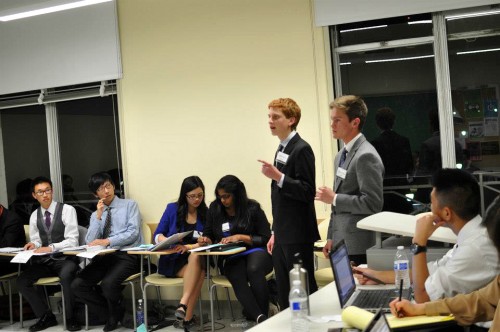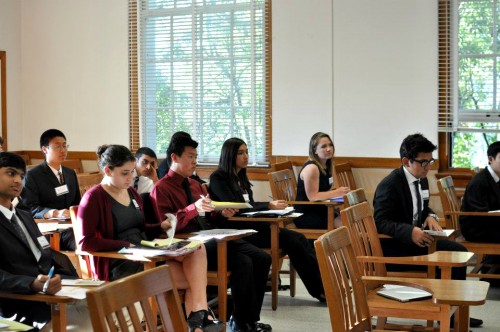Double delegation committees, whether in the General Assembly or Security Council, function differently than single delegation committees. Although the topic matters and procedure are similar, dual delegate committees also assess how effectively you work with your co-delegate. When I started competing with a co-delegate, I found it difficult to participate in a large committee and understand how to work with a partner in Model UN. Eventually, I learned a few helpful tips and strategies for succeeding as a double delegation:
1. Read up on both topics. Commonly, dual delegations divide their research. One delegate researches and writes the position paper on the first topic, while the other delegate does the same for the second topic. Although this method saves time, it leads to an uneven knowledge of the topics between you and your co-delegate, which can manifest itself during unmoderated caucus and impromptu speeches. To ensure that your country can actively participate on both topics in committee, try to be well-versed on both topics. Help your co-delegate on his/her topic by sending useful links, and review each other’s position papers.
2. Prepare and practice together. It’s important that committee isn’t the first time a dual delegation meets up. Co-delegates can prepare together by combining their articles, documents, and other information into one research binder and annotating its contents. In addition, double delegations should practice speeches and policies together. Meeting up before committee (and not just on the bus ride to the conference) helps smooth out the rough edges in your dual delegation’s performance.
3. Make speeches together. Giving great speeches as a double delegation shows teamwork. Plan out what both of you want to say beforehand, and alternate between who is speaking so the audience is more interested. Your double delegation’s first speech should ideally be drafted and practiced before entering committee. However, when speeches become more extemporaneous as committee progresses, don’t try to draft new speeches for you and your co-delegate. Instead, you can decide on 2-4 points to discuss and divide them between each other.
4. …unless time is an issue. For moderated caucuses and comments, the speaking time is usually 45 seconds or less, meaning that you only have time to get one or two points across effectively. In these cases, only one person from your double delegation should speak. One co-delegate can make a more persuasive comment or speech alone than both co-delegates trying to speak for around 15 seconds each.
5. Split up during unmoderated caucuses. Use your (human) resources efficiently! You and your co-delegate should rarely be standing side by side during unmod caucuses. Co-delegates can go to different caucus groups and later decide which one is best or whether to merge. Alternatively, one co-delegate can stay with a caucus group while the other can lobby and tell other countries to go to their group. As the committee begins forming resolutions, both of you should be doing separate tasks, such as resolution writing, lobbying, collecting signatories, etc. By splitting up, your double delegation can gain twice as much ground.
6. Play an equal role in committee. You want the committee to recognize your and your co-delegate as a team, so make sure both of you are active members in committee.
7. Communicate with each other. This sounds obvious, but I personally believe that it’s a fundamental tip for double delegations. In my experiences in dual delegate committees, I’ve seen lack of communication lead to arguments and confusion between co-delegates. You will almost inevitable disagree with your co-delegate once or twice, but it should never inhibit your performance in committee. Both of you might be novices in a competitive, advanced committee. One of you might have a diplomatic approach in committee, while the other believes in aggressiveness. One co-delegate might be intent on gaveling, while the other delegate’s goal is just to have fun at the conference. Regardless of what difficulties your dual delegation faces, communication is key.
Bonus tip: Color coordinate! It’s both stylish and impressive.
Do you have any questions, additional tips, or opinions about double delegation strategy? If so, leave a comment!



